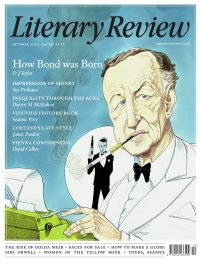Paul Cartledge
The First Imperialists?
The Scythian Empire: Central Eurasia and the Birth of the Classical Age from Persia to China
By Christopher I Beckwith
Princeton University Press 416pp £35
Few authors, academic or otherwise, come bedecked with as many glittering prizes as does Christopher Beckwith, distinguished professor in the Hamilton Lugar School of Global and International Studies at Indiana University Bloomington. He took his PhD in Inner Asian studies in Indiana’s Department of Uralic and Altaic Studies as long ago as 1977. This means that Beckwith comes at the people or peoples we call the Scythians from a decidedly Eastern standpoint, in contrast to, say, the more Western-focused Barry Cunliffe, whose book The Scythians appeared a few years ago. Whereas Cunliffe is an archaeologist, Beckwith is a linguist, a practitioner of what he calls ‘classical comparative-historical linguistics’. His book contains no fewer than thirty-two pages of preliminaries, including three on ‘Transcriptions & Conventions’, in which he states that he will be citing texts written in Old Iranic, Chinese, Japanese, Korean and Old Tibetan, as well as ancient Greek.
Beckwith straightforwardly tells us that the Scythians were ‘the earliest historical Central Eurasian steppe people’, a category that for him includes the Cimmerians, ‘their Scythian-speaking relatives’. He sets out to trace their lifestyle and influence from central Eurasia to China, taking in especially the world of the ancient Persians. The book’s chronology extends from the seventh century to the fourth century BC. Beckwith chooses to focus on topics misunderstood, neglected and (especially) unnoticed by his colleagues and competitors, presenting both new sources and new interpretations to help clear up misconceptions. This is not, therefore, a book for beginners. Readers should also be aware that his inferences, conclusions and claims are large, bold and controversial.
The book’s eight sturdy chapters cover such matters as the Scythians in the central Eurasian steppes, the Scythian royal lineage, the Scythian language, Scythian relations with China and the Scythian capitals of Media (in northern Iran), Chao and Ch’in. These are followed by an epilogue in which Beckwith does not

Sign Up to our newsletter
Receive free articles, highlights from the archive, news, details of prizes, and much more.@Lit_Review
Follow Literary Review on Twitter
Twitter Feed
Though Jean-Michel Basquiat was a sensation in his lifetime, it was thirty years after his death that one of his pieces fetched a record price of $110.5 million.
Stephen Smith explores the artist's starry afterlife.
Stephen Smith - Paint Fast, Die Young
Stephen Smith: Paint Fast, Die Young - Jean-Michel Basquiat: The Making of an Icon by Doug Woodham
literaryreview.co.uk
15th-century news transmission was a slow business, reliant on horses and ships. As the centuries passed, though, mass newspapers and faster transport sped things up.
John Adamson examines how this evolution changed Europe.
John Adamson - Hold the Front Page
John Adamson: Hold the Front Page - The Great Exchange: Making the News in Early Modern Europe by Joad Raymond Wren
literaryreview.co.uk
"Every page of "Killing the Dead" bursts with fresh insights and deliciously gory details. And, like all the best vampires, it’ll come back to haunt you long after you think you’re done."
✍️My review of John Blair's new book for @Lit_Review
Alexander Lee - Dead Men Walking
Alexander Lee: Dead Men Walking - Killing the Dead: Vampire Epidemics from Mesopotamia to the New World by John Blair
literaryreview.co.uk